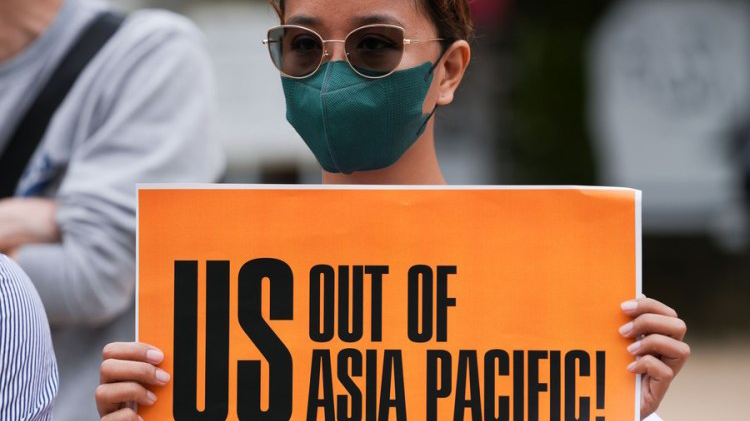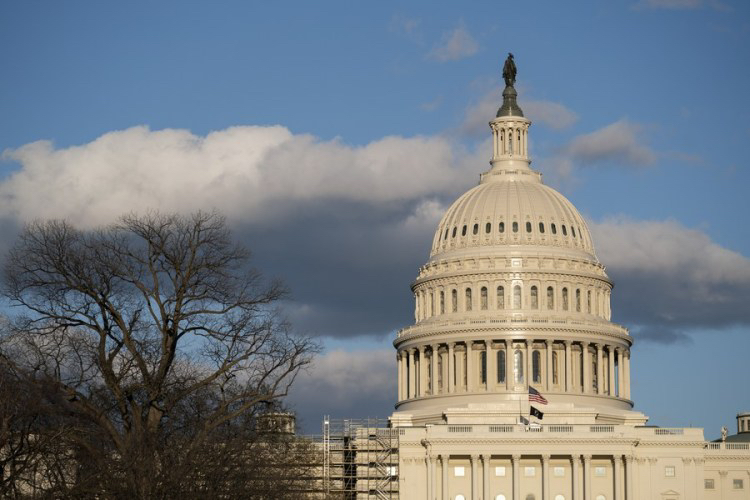
A demonstrator holds a placard at Hiroshima's Funairi Daiichi Park in a protest against the Group of Seven (G7) summit in Hiroshima, Japan, May 19, 2023. /Xinhua
A demonstrator holds a placard at Hiroshima's Funairi Daiichi Park in a protest against the Group of Seven (G7) summit in Hiroshima, Japan, May 19, 2023. /Xinhua
Editor's note:Bobby Naderi is a London-based journalist, guest contributor in print, radio and television, and documentary filmmaker. The article reflects the author's opinions, and not necessarily the views of CGTN.
On May 18, China's Ministry of Foreign Affairs released a disturbing report that rightfully put the U.S.'s coercive diplomacy in a negative light.
The paper, titled "America's Coercive Diplomacy and Its Harm," contains horrifying stories and terrifying examples that are distressing to read for any conscious person. Even though U.S. administration officials would like to maintain their denial, their one-sided foreign policy has been, and still is, blatantly obvious. The report paints a picture of an oppressive system that has no regard for national boundaries and chooses to use such tactics against everything and everyone, even its own allies.
The report primarily casts the U.S. in a negative light for violating intellectual property rights, invention rights, and patent rights, as well as for its notorious history of launching trade wars, tech wars, and economic warfare against nations like Cuba, the Democratic People's Republic of Korea, Venezuela, Iran, Russia, China, India, and Japan, as well as the countries in Africa and the European Union.
It's also depressing that the U.S., which withdrew from the UN Human Rights Council, has systematically continued to dominate efforts to raise bogus concerns about the Taiwan region, Hong Kong Special Administrative Region, and Xinjiang Uygur Autonomous Region by introducing legislation to smear China.
And that's just scratching the surface of the hot topic of being good at interfering in the internal affairs of other countries by supporting proxy wars, inciting civil wars, providing arms and ammunition, and training anti-government forces to counter "disobedient" nations and regions.
The harmful impact of American diplomacy
China's study makes the case that Washington's coercive diplomacy has had a significant impact on both the stability of the world and the unfortunate countries it has targeted.
By utilizing the hegemony of its currency, trade restrictions, long-arm jurisdiction, political meddling, military coercion, and intellectual infiltration, the U.S. government has managed to cause economic suffering, political unrest, and armed conflicts in various regions of the world.
Economic suffering: The U.S. has imposed sanctions and financial limitations, damaging the economies of targeted nations, by taking advantage of the dollar's hegemony. These actions frequently result in inflation, local currency devaluations, and limited access to international financial systems. Such behaviors have had dire repercussions, including economic instability, unemployment, and limited opportunities for advancement in places like Iran and Venezuela.
Political unrest: Political involvement in the internal affairs of other countries is a common component of coercive diplomacy. The U.S. regularly backs opposition organizations, orchestrates regime changes, and places political restrictions on aid and collaboration. These initiatives have had the potential to destabilize regional governance frameworks, foster societal divisions, and intensify ongoing conflicts.

The Capitol building in Washington, D.C., the United States, March 28, 2022. /Xinhua
The Capitol building in Washington, D.C., the United States, March 28, 2022. /Xinhua
Armed conflict: The U.S.'s use of military force has fueled armed conflict in different regions. Under the pretense of advancing democracy or combating terrorism, military interventions and operations have led to protracted wars, casualties, and extensive destruction in Iraq, Syria, Yemen, and Libya. Power vacuums, humanitarian crises, and animosity were all brought on by these wars, which exacerbated instability and fed a cycle of bloodshed and terrorism across the Middle East.
The international community's response
For a more balanced and peaceful international order, it is essential for the international community to be aware of these detrimental repercussions and consider alternatives to America's bellicose diplomacy.
Promoting multilateral institutions: Multilateral organizations that are already in place, such as the UN, the BRICS, the Shanghai Cooperation Organization, and the World Trade Organization, must be strengthened for the mutual benefit of sharing global governance responsibilities. By supporting these frameworks, countries can work together to settle disputes, lessen the effect of coercive action, and advance a rules-based international order.
Economic diversification: Targeted countries can concentrate on diversifying their economies and lowering reliance on a single dominating currency like the U.S. dollar to decrease vulnerability to economic sanctions. Greater resilience and a reduction in the effects of coercive economic measures can be achieved by promoting regional trade agreements, developing domestic sectors, and looking for alternative finance channels like the Chinese yuan and the BRICS currency.
Strengthening regional cooperation: Regional partnerships and alliances can be crucial in fending off aggressive diplomacy. Developing closer ties among neighboring countries will help the area as a whole withstand outside pressure and advance common goals. Creating channels for regional economic integration and dispute resolution can bring stability, lessen reliance on outside actors, and increase resistance to forceful diplomatic measures.
Promoting dialogue and mediation: The goals of diplomacy should be to promote understanding, resolve issues, and identify common ground. Conflicts can be resolved peacefully through mediation by impartial parties or international organizations.
In a new era characterized by diminishing U.S. global clout, for instance, it was China's non-interventionist approach and lack of historical and political baggage in the Middle East that brought Iran and Saudi Arabia into a positive relationship. Whatever the desire of America's leaders, that successful track record is the reason why China is now trying to mediate between Moscow and Kyiv in order to end the crisis in Ukraine.
No less significantly, by strengthening multilateral institutions, diversifying economies, promoting regional cooperation, and prioritizing dialogue and mediation, nations can collectively push back against U.S.'s coercive diplomatic tactics on all fronts. As China's report makes clear today, only through a concerted effort to foster a more balanced and peaceful international order can the world mitigate the harmful impact of America's aggressive diplomacy and ensure a more prosperous future for all.
(If you want to contribute and have specific expertise, please contact us at opinions@cgtn.com. Follow @thouse_opinions on Twitter to discover the latest commentaries in the CGTN Opinion Section.)